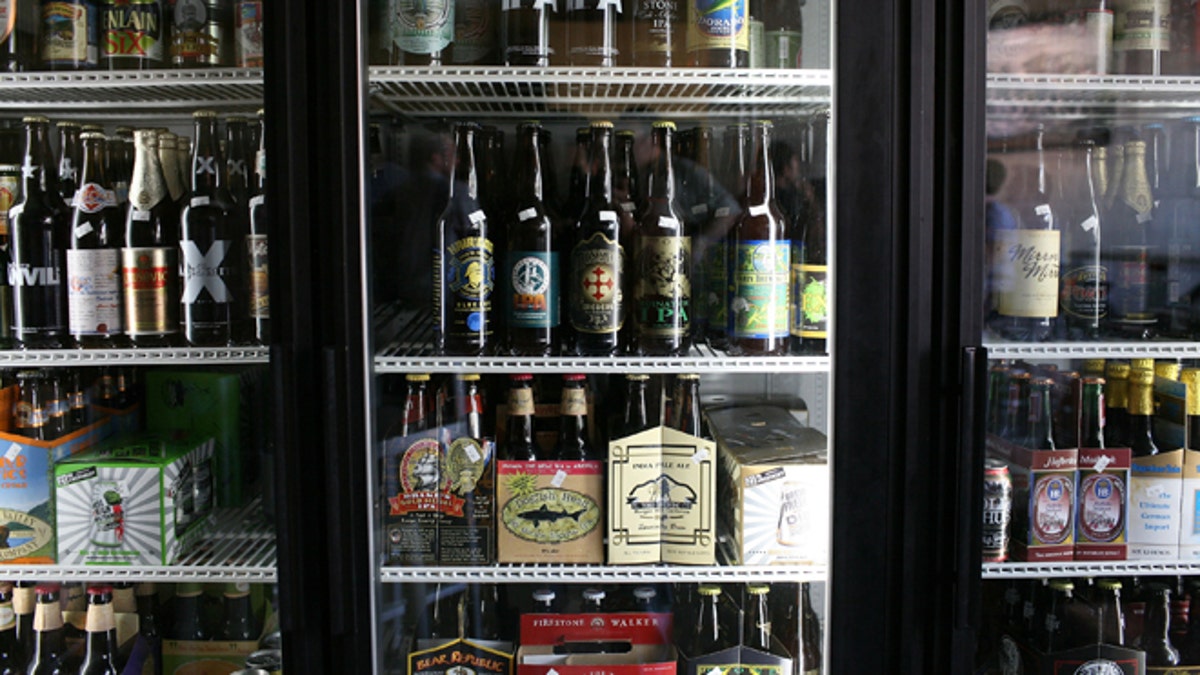
SAN FRANCISCO - MAY 20: Six packs and single bottles of beer are displayed on a shelf at the City Beer Store May 20, 2009 in San Francisco, California. Federal lawmakers are considering an increase on tax paid for beer, wine, liquor and sugary sodas to help fund health insurance for an estimated 50 million uninsured Americans. Under the proposal, taxes on beer would be increased by 48 cents a six-pack. (Photo by Justin Sullivan/Getty Images) (2009 Getty Images)
Marco Sabillon lays down for no one – and that includes the city of Memphis.
The Honduran immigrant owns a grocery store in the Berclair section of the city called Guadalupe Tienda Hispana, that he says operated under an unjust disadvantage: He could not sell beer.
That's because of a city ordinance that prevents the sale of beer and liquor within a 250-foot radius of a church or school, which Sabillon didn't know about when he took over the store from a previous owner.
"I thought I would be able to sell beer," he told Fox News Latino. "At a store that sells Hispanic groceries, you sell a lot of beer. But when I went to do the paperwork, I found out that I couldn't."
The reason is Grimes Memorial United Methodist church, around the corner on Summer Ave.
- Juanes, John Legend perform at immigrant detention center
- Deportation shelved for 1-year-old Honduran boy
- A sombrero for Francis: Family creates traditional Mexican hats for popes
- Meet Jimena Sanchez, the ‘Mexican Kim Kardashian’
- N.M. lawmakers to discuss REAL ID Act amid pressure from immigration groups
- ‘Hispandering’ or just campaigning? Some try to give Latino outreach negative spin
- Number of immigrants deported in last 12 months lowest since Obama took office
Sabillon is a married 47-year-old with three kids who arrived in the U.S. illegally in 1993. He was granted legal status and moved to Memphis in 2002. "I was looking for opportunities," he said.
His store is in the Berclair area of the city, where a lot of Mexicans and Hondurans have moved in recent years.
"In the Hispanic community, when people go grocery shopping, they don't want to go to five different stores," Garland Reed, the founder of the Mid-South Hispanic Chamber of Commerce told the Memphis Flyer. “They want to do their shopping in one place, and they drink beer. They want to buy their beer where they buy their tortillas – but he didn't sell beer, so they stopped shopping there."
Especially, Sabillon said, after a Walgreen’s opened next door to the church.
Sabillon was shocked to discover that, despite the 250-foot ordinance, the Walgreen’s sold beer. Summer Ave. is also U.S. Route 70, and there’s an exception in the ordinance for businesses located on highways. Which was discriminatory, Sabillon believed, because small, Latino-owned brick and mortar businesses are mainly located on the side streets, where real estate is cheaper.
So in November, he hired an attorney, Drayton Berkley, and filed a lawsuit against the city of Memphis, claiming that the ordinance is biased. As a result, he said, Guadalupe Tienda has been the subject of harassment. “County sheriffs pull over all my customers after they’ve driven 6, 7 blocks,” he claimed.
“[The City of Memphis] tries to intimidate people using immigration status,” Berkley told FNL. “They warn people not to make waves and threaten them and their families … [but] they couldn’t do that to him.”
Berkley also helped Sabillon apply for an off-premises consumption permit. "Once we got down to the [permit] hearing, and the city's lawyer found out there was a lawsuit pending, they found a way to grant him a permit," Berkley told the Flyer.
That was in December, but Sabillon isn’t satisfied.
For one thing, he still doesn’t sell a lot of beer. “They threatened me, saying I couldn’t sell more than 10 percent of my total sales from beer,” he said. “It's hard, because you don’t know how much your total sales are going to be.”
Sabillon limits how much beer he puts in the cooler in order to make sure he doesn’t go above the 10 percent. “I can’t afford to pay a fine,” he told FNL, “and I don’t want to get the permit revoked.”
For another thing, the Honduran immigrant says he believes the church and school provision should be stricken.
"I know other Hispanic people who want to open a business” selling beer, Sabillon told the Flyer. “Unfortunately, Memphis has a lot of churches."
Reed has said he’s working with another Latino business owner who he says is trying to open a restaurant and sell beer and she’s facing similar issues.
“[Sabillon] is a hero in the community,” Berkley told FNL. “He prevailed, and now others are coming forward to try to get the license. The whole point of the ordinance originally was to prevent African-Americans from selling alcohol, now those businesses are owned by Latinos.”
